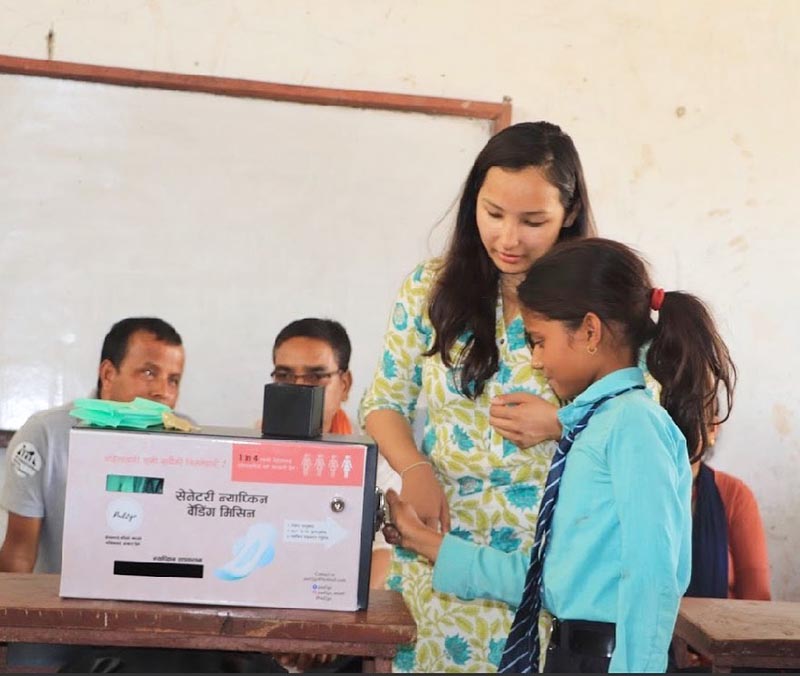Pad2Go: Advocating for menstrual health and breaking taboos
KATHMANDU: A black plastic bag, inside it a packet well-wrapped in an old newspaper; every girl buying sanitary products in the country is familiar with such a package and the "shame" attached to it. Every female-- from a school going teenager to a working adult-- has mastered the art of discreetly transporting their sanitary pads to the bathroom from their bags.
In Nepal, a dominantly Hindu country, menstruation is highly associated with the notion of impurity and over 89% menstruating females are victims to some form of restriction or exclusion. These restrictions range from not being allowed to enter places of worship and the kitchen, or sleep on a bed to, in extreme cases, being banished to cowsheds from their own homes (i.e. Chhaupadi) out of fear of contamination. In some cases, the exiled girls fall victims to sexual assault and even death.
Although Chhaupadi was criminalised in 2017, society has internalised the concept of menstruating women as impure and the derivatives of the practice are still prevalent around the country. Women on their periods are often referred to as nachuney, which literally translates to untouchable.
Such language and ill-practices camouflaged in the name of traditions have resulted in a deeply rooted cultural taboo that surrounds the topic of menstruation.
The stigmatisation of menstruation and the lack of discourse around the topic not only ostracise young girls and women for carrying out a natural phenomenon but also creates obstacles in their day-to-day lives.
Sanitary products are not easily accessible, especially in the rural areas, and women and their families do not have proper information about menstrual health. A 2017 Scoping Review about Menstrual Health and Hygiene Management in Nepal conducted by Maverick Collective found out that 83% of women still use cloth rags while only 15% use proper sanitary napkins and/or tampons. However, girls and women are ashamed and embarrassed to openly talk about their struggles due to the stigma surrounding the issue. In multiple cases, this results in absenteeism from schools as well.
In such a society, two ambitious women, Shubhangi Rana and Jesselina Rana, are leading a social enterprise that aims to break down taboos surrounding menstrual health. Founded in 2018, Pad2Go started off as an enterprise to introduce vending machines for sanitary napkins for the first time in the country. With time, however, it is taking a more holistic step forward in the sector of menstrual health.
“Pad2Go aims to be a holistic movement in the menstrual health field and focuses on access to sanitary products, sanitary facilities alongside efforts at normalising the topic of menstruation,” stated co-founder Jesselina Rana. “We aim to create an environment where women and girls are not stopped from accessing education and public facilities as a result of their menstrual cycle.”
According to an article published in The Himalayan Times, Bajura district of the far-western region of the country has only around 250 girls enrolled in schools and even then adolescent girls miss around 4-5 days of school every month due to menstruation. The lack of proper sanitary products and the inability to afford them results in girls being confined to their homes.
In a study about menstruating girls in Kathmandu Valley, Ashok Pandey, assistant research officer at Nepal Health Research Council discusses how the lack of gendered bathrooms and the fear of being embarrassed while menstruating still prevents hundreds of girls from attending school not just in rural areas but even in the capital city.
Understanding the grave situation of educational institutions for young girls, Pad2Go has already installed 60 vending machines across four provinces (1,3,4,5) in just 9 months. Through collaborative efforts with Whisper Nepal and Safety Nepal the machines, which do not require electricity or batteries to operate, are able to provide sanitary pads at a lower price than the market making it more accessible to females across the country.
“They [workshops] help to create conversations around the topic and students are able to share their own experiences and understanding of the taboos and their impacts on their lives,” shared Rana.
With the support of multiple schools and offices that have reacted very positively to the initiative and have understood the need for these vending machines have immensely helped this much-needed social enterprise.
However, in a patriarchal society like ours, the journey has not always been smooth for the two passionate women.
“One of the biggest challenges as young women establishing a business was definitely to make ourselves be taken seriously in the initial phase,” explained Rana. “But we view these challenges as opportunities for ourselves to grow and also to help other young women entrepreneurs to not give in easily.”
Setting an example for not just girls and women but everyone in the country, the two women have laid a solid foundation in the menstrual health sector by providing greater access to sanitary products and by fighting taboos surrounding the topic.
Pad2Go lends itself to start larger conversations about other pressing issues and ill-practices that are enrooted in Nepali society in the name of culture.






